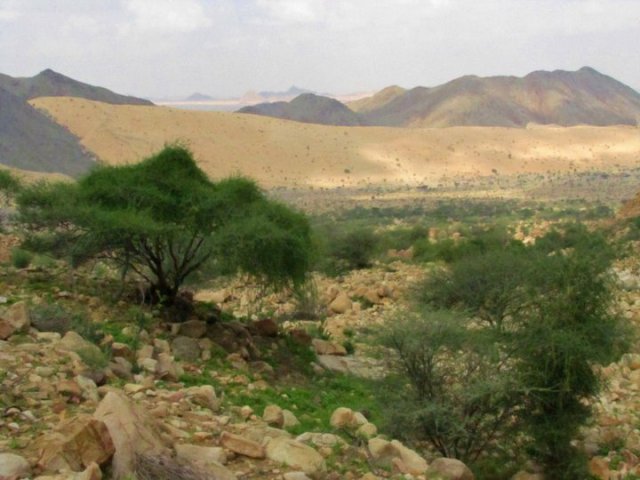
Off the off-road tracks deep in Egypt's eastern desert, prospectors are ramping up the hunt for the treasure once revered by the Pharaohs as the "skin of the gods" — gold.
Essential for ancient artifacts like the famed burial mask of Tutankhamun and still highly desired in Middle Eastern culture today, gold has been mined in Egypt for millennia. But experts say the country is heavily underexplored and that modern technology now allows much deeper excavation of the ancient sites shown on Pharaonic treasure maps.
If developed, gold and mineral mining could prove a boon to the country at a time it is desperate for foreign currency, and provide jobs for its burgeoning population of 90 million. But miners and experts say current legislation is out of step with global practices and doesn't give enough incentives to bring in foreign investment.
"Mining has been going on here for over 5,000 years, but in the 21st century it's essentially virgin ground," said Mark Campbell, president of the Canadian exploration company Alexander Nubia, which is increasing its drilling this year in a 1,070-square mile area in the desert. "Exploring for gold and minerals in Egypt today with modern technology is like having a map where X marks the spot."
The group has identified six potential mines in the area, filled with barren valleys and pink rock outcroppings known as the Arabian-Nubian Shield, which stretches south to Eritrea and east to Saudi Arabia. While veins close to the surface have been largely excavated by successive Pharaonic, Roman and even British colonial operations, the sites still hold gold concentrations deeper down that nowadays can be extracted with heavy machinery.
At the moment, Campbell's team is drilling core samples that are sent off for analysis in Romania. The gold can't always be seen by the naked eye, with concentrations of only a few grams per ton of dense, mineral-filled ore. But it's promising enough for the team of two dozen explorers and specialists to have undertaken plans to open Egypt's first new mine by 2019.
One former British colonial-era mine in the area, known as Abu Zawal, was abandoned in the mid-20th century after nationalist strongman President Gamal Abdel Nasser chased away foreigners and ended decades of laissez-faire capitalism in the Arab world's most populous country. The British also had been following in the tracks of the ancients — the site is still littered with Roman pottery fragments, an ancient fort and water well, as well as Pharaonic grinding stones that lie scattered alongside turn-of-the-century spent rifle cartridges.
But the mining sector today remains largely dormant, a victim of outdated policies, experts said. Despite some reforms that went into effect last year amid government promises to create more favorable investment laws, Egypt's mining legislation still falls short of international standards, and attempts by the government to attract foreign investment have largely failed.
"No one wants to deal with the profit-sharing structure," said Yousef Husseini, an analyst at Egyptian bank EFG Hermes who follows the mining sector.
"The ideal setup would be royalty and taxes as opposed to royalty and profit share, as is currently the case," he said, referring to the current system where mining companies in Egypt must pay at least half of their profits to the state in addition to royalties paid annually based on sales figures. In most other countries, taxes levied on companies in the mining sector range from 25 to 50 percent.
Mark Tyler, an investment banker with Nedbank in London, agrees that the current split of profits demanded by Egypt is out of step with global practices. Mines are both expensive to build and to operate throughout their lifespans, unlike oil and gas discoveries that run relatively cheaply after the initial investments.
"There's a long history of small-scale mining in Egypt. Generally that's a good indication there are minerals in the area," Tyler said. "But those rules are pretty harsh. Typically you have royalties and taxes and some type of state shareholding in the company, like is often the case in West Africa and the rest of the world."
The exception is the Sukari mine, Egypt's only modern mining operation, which has consistently increased its profits in recent years. Built over another ancient gold mining site further to the south, the company that runs it, Centamin, has seen its share price grow by over 60 percent since the beginning of the year, buoyed by rising gold prices and a 15.7 percent increase in production in the first quarter compared to last year.
The company has a special deal that was approved by parliament during the rule of Hosni Mubarak, Egypt's long-time strongman who was ousted in a popular uprising in 2011. Its success was briefly halted the following year, when the country was under the rule of the elected but divisive Islamist, Mohammed Morsi, and a court decreed that Centamin's right to operate Sukari was invalid.
But since general-turned-president Abdel-Fattah el-Sissi led Morsi's overthrow in 2013, promising a business-friendly government that would protect and streamline investments, Centamin has regained confidence. Its license was upheld briefly before Morsi's ouster, although the case is still facing appeal with a decision due in late May. The company believes it is in a good position, given more recent legislation that bolsters property rights.
Under el-Sissi, the government has talked of creating a "Golden Triangle" of development in the area, one of its favored "mega projects" to spark the fast economic growth needed to provide jobs. But like investment law reforms announced in 2015, that plan has so far fallen short, with investors still regularly complaining of endless red tape when doing business in Egypt.
Still, the players involved in mining today are decidedly upbeat. Both Campbell and Centamin's chairman, Josef El-Raghy, envision a future where new mines could sprout up all over Egypt.
"If there were more favorable legislation, there'd be dozens of companies all around the area," said geologist Leonard Karr, an American with Campbell's company who has worked for 36 years in the industry, as he enthusiastically pointed out rock formations during a jeep tour of the area.
As Campbell, who has overseen mining and oil drilling in a dozen or more countries over the years, put it: "Egypt is a geological Disneyland."


